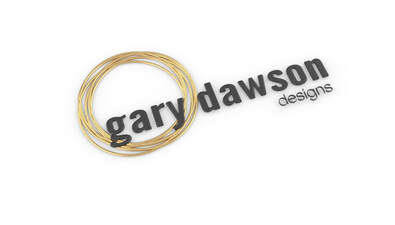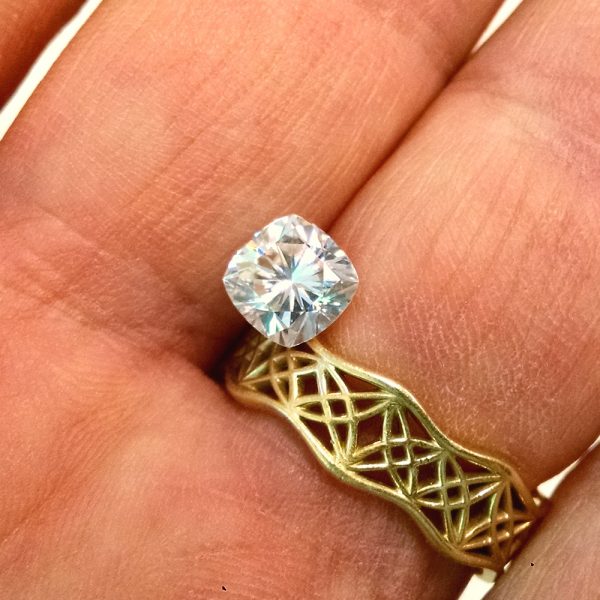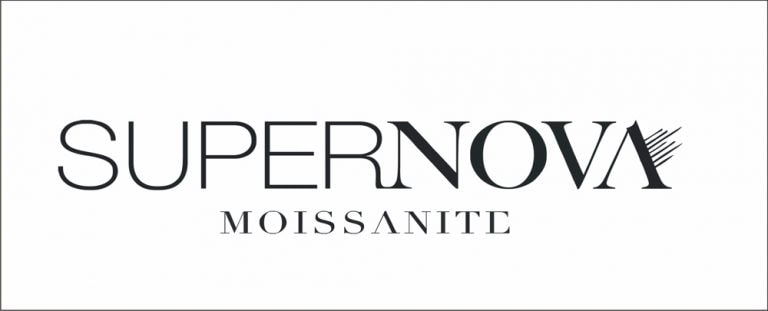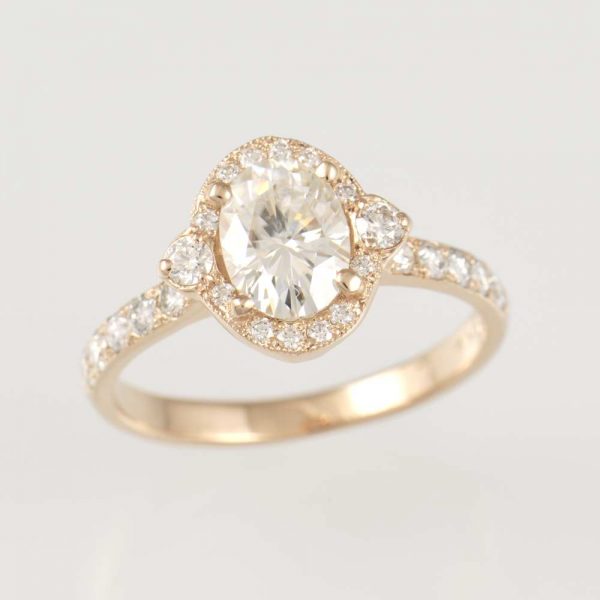|
We have recently fielded many recent requests about, and have completed several projects using Moissanite, a white gem that is both sustainable and ethical. Accordingly, we are now proud to announce our affiliation with the Supernova Moissanite brand and our dealership status. What is Moissanite? Moissanite is a variety of silicon carbide, the second hardest natural mineral. As a gemstone it is an exceptionally brilliant alternative to diamond that does not involve destructive extractive practices and is conflict free. It is also very durable, at 9.25-9.5 on the MOS hardness scale. For comparison, sapphire and Ruby are about 9 on the MOS scale and diamond is 10 (though the scale is not linear). Some say that “Moissanite is a gemstone born from the stars.” It was first discovered in 1893 by French scientist Henri Moissan who later won the Nobel Prize in Chemistry. He discovered microscopic particles of the gem that would eventually bear his name in Arizona, in a meteorite crater near Canyon Diablo. He initially thought that he had discovered diamonds, but later determined that the crystals were composed of silicon carbide, not carbon. Natural Moissanite is incredibly rare, so Moissanite gems available today are laboratory-created. The particles Moissan discovered were eventually synthesized to produce what is now one of the world’s most interesting new gemstones. This gem holds a lot of interest among savvy consumers that appreciate a little “bling” but prefer not to support extractive resources when possible. It is also quite inexpensive when compared to diamond!Moissanite vs. Diamond, Gary Dawson Comments… Having handled many larger diamonds over my long career, and now at least a few larger Moissanites, I can offer some comparisons. To the eye they compare very favorably. I think even the practiced eye of most jewelers may have a hard time telling any difference in a piece of jewelry at arm’s length, where it would be most often viewed. Some technical facts that support my statement are that the RI (Refractive Index, the angle at which light bends as it passes through any translucent material) of Moissanite is actually a bit higher than diamond, as is dispersion. This is important because the biggest difference between diamond and most of its substitutes is how the gem looks when it gets dirty. When a piece of jewelry is worn, a film of “stuff” collects on the backside of the gem. Hand lotions, soap residue, sweat, all manner of things come into contact with the jewelry and on the bottom side of the gem, where it is not continually swept away from environmental contact, it collects. This tends to impede the reflective, and refractive qualities of any gem. They look dull over time. Both diamonds and Moissanite will begin to look dull if they are not cleaned periodically (more about that in a minute*) but gems with higher RI will retain brilliance longer as junk collects on the gem than gems with lower RI, like white sapphire, Cubic Zirconia and any other gem that might be compared with diamond. That’s what has, until recently, set diamond apart from its stimulants, and what now seems to make Moissanite seem very attractive, even compared to diamond. Contact us here today to inquire about your next big bling using Moissanite.
* In terms of keeping your gems at their optimal brilliance, I recommend keeping an old, soft-bristled toothbrush in the shower, and once in a while, when you think of it but probably not every shower, scrub the backside of your jewelry with the brush and soapy water then rinse thoroughly. Once out of the shower, simply blow excess water from your jewelry. This is likely all you’ll ever need to do to keep your things looking their best!
0 Comments
Leave a Reply. |
Author
|





 RSS Feed
RSS Feed